Unit 6Do you like bananas Section A Grammar focus-3c 课件(共35张PPT)人教版七年级英语上册
文档属性
| 名称 | Unit 6Do you like bananas Section A Grammar focus-3c 课件(共35张PPT)人教版七年级英语上册 | 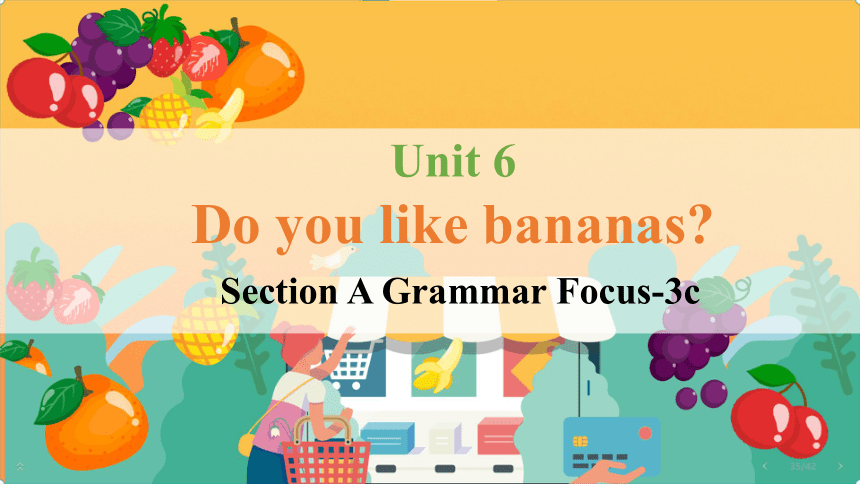 | |
| 格式 | pptx | ||
| 文件大小 | 46.1MB | ||
| 资源类型 | 教案 | ||
| 版本资源 | 人教新目标(Go for it)版 | ||
| 科目 | 英语 | ||
| 更新时间 | 2023-11-28 17:57:29 | ||
图片预览

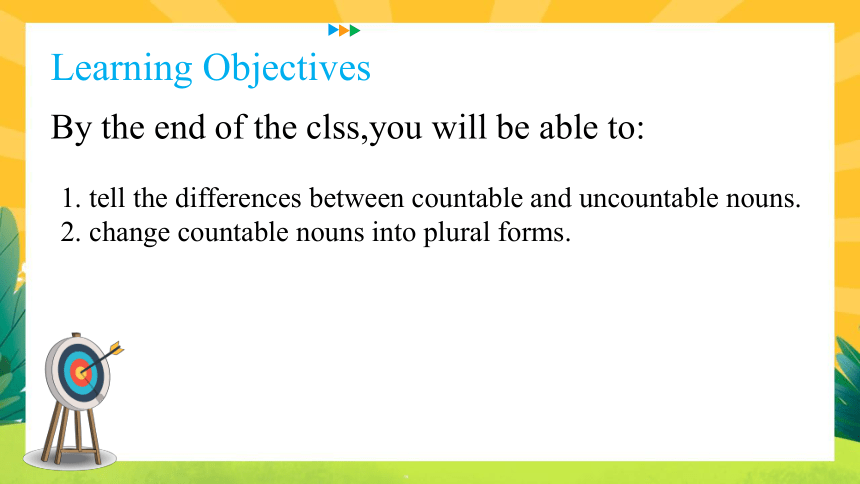
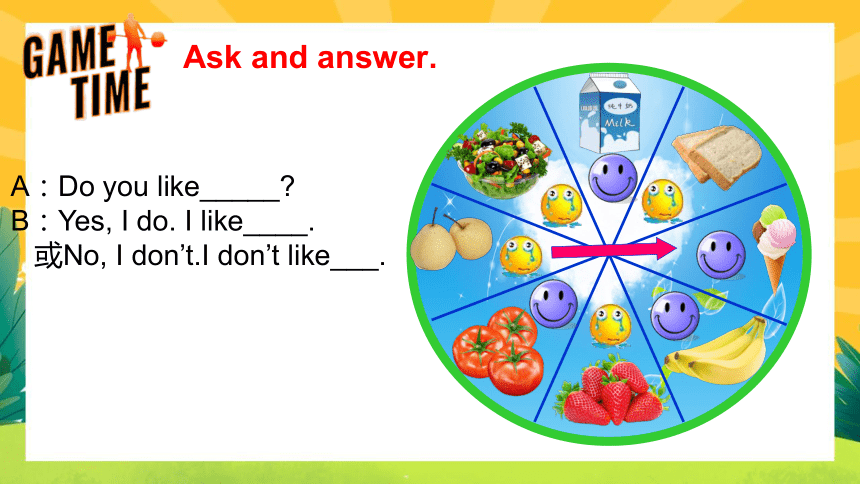
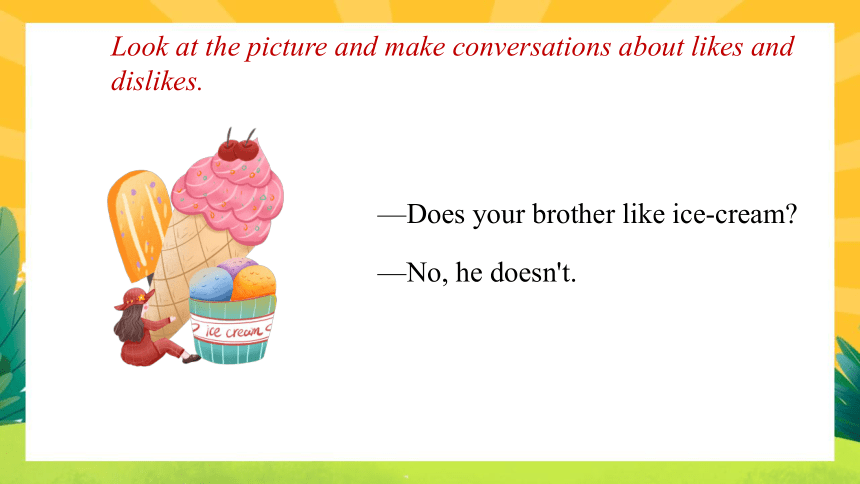

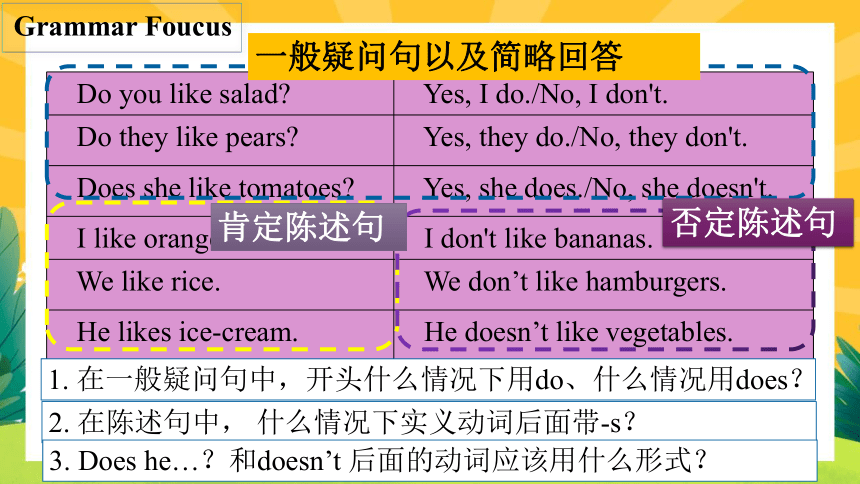
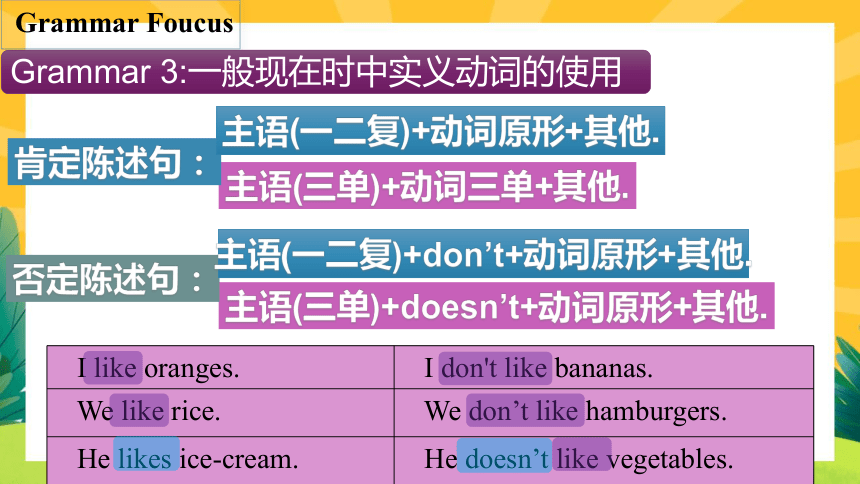
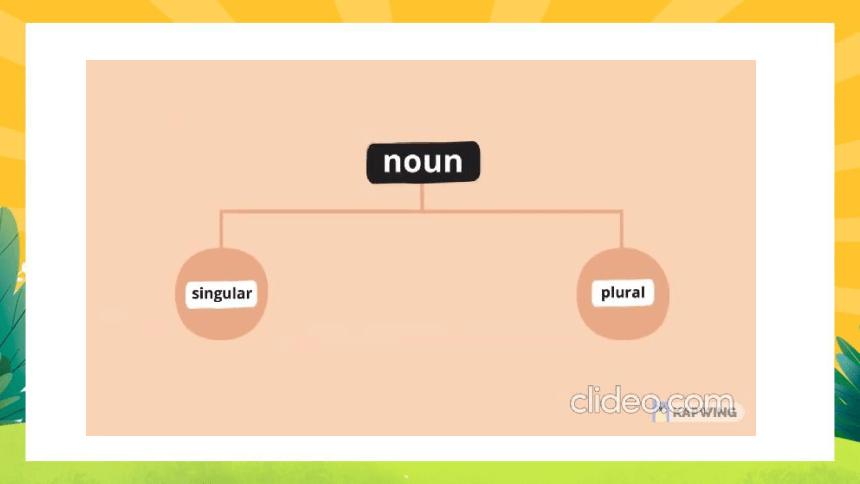
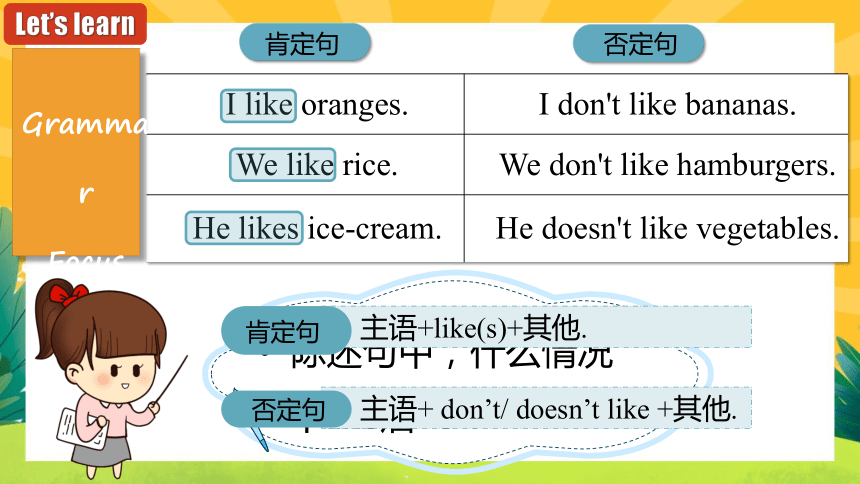
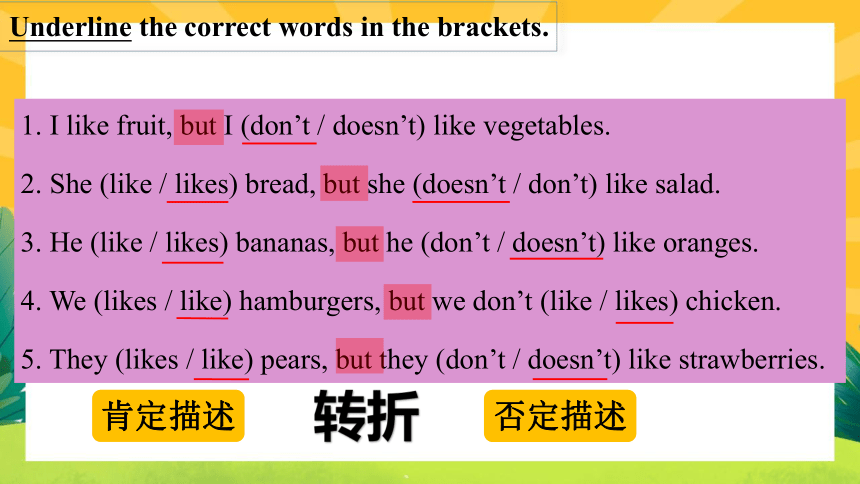

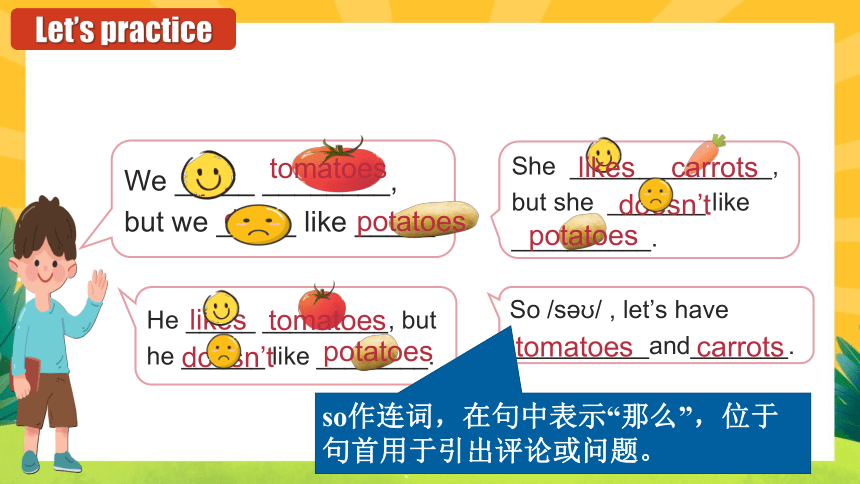
文档简介
(共35张PPT)
Unit 6
Do you like bananas
Section A Grammar Focus-3c
Learning Objectives
1. tell the differences between countable and uncountable nouns.
2. change countable nouns into plural forms.
By the end of the clss,you will be able to:
Ask and answer.
A:Do you like_____
B:Yes, I do. I like____.
或No, I don’t.I don’t like___.
—Does your brother like ice-cream
—No, he doesn't.
Look at the picture and make conversations about likes and dislikes.
How to talk about likes and dislikes
Grammar Foucus
Do you like salad Yes, I do./No, I don't.
Do they like pears Yes, they do./No, they don't.
Does she like tomatoes Yes, she does./No, she doesn't.
I like oranges. I don't like bananas.
We like rice. We don’t like hamburgers.
He likes ice-cream. He doesn’t like vegetables.
一般疑问句以及简略回答
肯定陈述句
否定陈述句
1. 在一般疑问句中,开头什么情况下用do、什么情况用does?
2. 在陈述句中, 什么情况下实义动词后面带-s?
3. Does he…?和doesn’t 后面的动词应该用什么形式?
Grammar Foucus
Grammar 3:一般现在时中实义动词的使用
主语(三单)+动词三单+其他.
主语(三单)+doesn’t+动词原形+其他.
肯定陈述句:
主语(一二复)+动词原形+其他.
否定陈述句:
主语(一二复)+don’t+动词原形+其他.
I like oranges. I don't like bananas.
We like rice. We don’t like hamburgers.
He likes ice-cream. He doesn’t like vegetables.
I like oranges. I don't like bananas.
We like rice. We don't like hamburgers.
He likes ice-cream. He doesn't like vegetables.
Grammar
Focus
肯定句
否定句
陈述句中,什么情况下like后+s
主语+like(s)+其他.
主语+ don’t/ doesn’t like +其他.
肯定句
否定句
Let’s learn
Underline the correct words in the brackets.
1. I like fruit, but I (don’t / doesn’t) like vegetables.
2. She (like / likes) bread, but she (doesn’t / don’t) like salad.
3. He (like / likes) bananas, but he (don’t / doesn’t) like oranges.
4. We (likes / like) hamburgers, but we don’t (like / likes) chicken.
5. They (likes / like) pears, but they (don’t / doesn’t) like strawberries.
肯定描述
否定描述
转折
可数名词和不可数名词
可数名词
可以计数的名词称为可数名词。
一般有______与______两种形式,前面可加__________来修饰。
不可数名词
不可计数的名词称为不可数名词。
______复数形式, 前面______用不定冠词a, an, 也______直接加数词,但可以跟某些____________搭配, 表示数量。
如: a glass of water, two cups of tea.
单数
复数
a,an或数词
没有
不能
不能
量词短语
Let’s practice
We _____ ________, but we _____ like _____.
So /s / , let’s have __________and_______.
She ______ ________, but she _______ like __________.
He _____ _________, but he ______ like ________.
like
doesn’t
likes
don’t
doesn’t
likes
tomatoes
potatoes
carrots
potatoes
potatoes
tomatoes
tomatoes
carrots
so作连词,在句中表示“那么”,位于句首用于引出评论或问题。
名词是指人或事物的名称。根据所表示事物的性质,名词可分为可数名词和不可数名词。可数名词有复数形式,不可数名词一般没有复数形式。
语法概述
可数名词与不可数名词
可数名词单数变复数的规则
1. 直接+s
eg. student- apple-
tree- pear-
students
apples
trees
pears
2. 以s,x,sh,ch结尾的名词+es
eg. class- classes box- boxes
dish(餐具)- dishes watch- watches
Let’s learn
Try to find out the rules.
I have an orange.
I have two oranges.
I have a banana.
I have two bananas.
可数名词单数
=可数名词复数
+s
可数名词变复数变化规则1:
一般情况下在名词尾加s
Let’s learn
Try to find out the rules.
I have a strawberry.
I have two strawberries.
可数名词单数:
辅音字母
=可数名词复数
+ies
+y结尾
可数名词变复数变化规则2:
辅音字母+y结尾的名词,y变i+es
可数名词单数变复数的规则
3. 以o结尾的名词
有生命的或能吃的+es,无生命不能吃的+s
eg. tomato- tomatoes potato- potatoes
photo- photos piano- pianos
4. 以辅音字母加y结尾的名词
改y为i,再+es
eg. strawberry- strawberries city- cities
定义:在某些情况下能计数,在某些情况下
不能计数的名词。
e.g. (1) a chicken 一只鸡
chicken 鸡肉
(2) an ice-cream 一个冰淇淋
ice-cream 冰淇淋(指成份)
(3) a salad 一碟沙拉
salad 沙拉(指成份)
countable and uncountable nouns
不可数名词
Uncountable nouns
(1)
(2)
(3)
定义:是指不能计数的名词。
不可数名词前不可以用a, an,this,those限定。但是可用定冠词the或some,lots of/a lot of(许多)来修饰。
不可数名词没有复数形式。
不可数名词的数量要借助“基数词+表示量的名词+of”短语表达
e.g.three pieces of bread 三块面包 two glasses of milk 两杯牛奶
e.g. Some chicken is on the brown table. You can have some.
(4) 作主语时,谓语动词要用单数形式。
Let’s learn
Try to find out the rules.
I have a tomato.
I have two tomatoes.
I have a photo.
I have two photos.
可数名词单数:
有生命,O结尾
=可数名词复数
+es
可数名词变复数变化规则2:
以o结尾的名词,有生命+es,无生命+s
1.sister __________ 2. friend __________
3. parent _________ 4. family ____________
5.box___________ 6. bush__________ 7.tomato___________ 8. woman___________
9.potato_________ 10.life_________ 11.thief___________ 12. bus______________
13.radio__________ 14.orange__________ 15.watch__________ 16.strawberry____________
17.foot____________ 18.child__________ 19.man__________ 20.baby____________
sisters
friends
parents
families
boxes
bushes
tomatoes
women
potatoes
lives
thieves
buses
radios
oranges
watches
strawberries
feet
children
men
babies
Let’s learn
Try to find out the rules.
I have milk.
I have bread.
粉末/颗粒类,如:flour(面粉),rice(米饭)
液体、气体等,如:water(水),air(空气)
语言、学科等,如:English(英语),Chinese(汉语)
肉类,如:beef(牛肉),pork(猪肉)
油脂类,如:oil(油),butter(黄油)
一些抽象名词,如:knowledge(知识),friendship(友谊)
常见的不可数名词
一般情况下在词尾加______。
以__________________结尾的名词在词尾加 es。
以___结尾的名词_____在词尾加 es______加 s。
以____________结尾的名词,将______,再加_____。
以_____结尾的名词,将_________,再加_____。
小结可数名词变复数变化规则
s
s,x,ch,sh
辅音字母加y
y变为i
es
o
有生命
无生命
f或fe
f或fe变为v
es
注:少数名词的复数形式是不规则的,如:man-men等。
Countable and uncountable nouns
用法 例句
food 通常作不可数名词,表示食物的总称; 当表示特定种类的食品时,其复数形式为foods。 The food here is very delicious.这儿的食物很美味。
frozen foods冷冻食品
fruit 表示水果的总称时,为不可数名词; 表示水果的种类时,是可数名词,其复数形式为fruits。 I eat some fruit every day.我每天都吃一些水果。
Apples, bananas and pears are my favorite fruits.苹果、香蕉和梨是我最喜欢的水果。
ice-cream 表示“一份冰激凌”时,为可数名词时,用不定冠词修饰时,用an。 I like ice-cream.我喜欢冰激凌。
Please give me an ice-cream.请给我一份冰激凌。
salad 泛指沙拉这种食品时,为不可数名词; 特指沙拉作为一份食物时, 为可数名词。 Would you like some salad with your pasta 你的意大利面要配些沙拉吗?
a side salad 配菜沙拉
Choose your favorite food.
Don’t repeat.( 选择你最喜欢的食物,不要重复)
Gifts
【活学活用】
根据句意,用括号内所给单词的适当形式填空。
1. The ________(apple) on the tree are red.
2. He likes ___________(vegetable), but I don’t like them.
3. Here’s some ________(rice).
4. How about ________(fish) Do you like them
5. Look! There are five ________(egg) on the table.
6. Cindy doesn’t like eating ________(chicken), because she likes ________ (chicken).
apples
vegetables
rice
fish
eggs
chicken
chickens
用所给单词的适当形式填空
1. Selina _____ (like) apples.
2. _____ your father ____ (like) eggs
3. He ________ (not like) rice.
4. I have some ____ (egg).
5. I don’t like ____ (milk),____ I like fruit.
6. My sister likes ______ (tomato), but I don’t.
7. Do you like _______ (chicken)
likes
like
Does
doesn’t like
eggs
milk
tomatoes
chicken
but
1. I like fruit, but I (don’t / doesn’t) like vegetables.
2. She (like / likes) bread, but she (doesn’t / don’t) like salad.
3. He (like / likes) bananas, but he (don’t / doesn’t) like oranges.
4. We (likes / like) hamburgers, but we don’t (like / likes) chicken.
5. They (likes / like) pears, but they (don’t / doesn’t) like strawberries.
Underline the correct words in the brackets.
3a
but前面是肯定描述
but后面是否定描述
Let’s practice
I like fruit, but I don’t like vegetables.
She likes bread, but she doesn’t like salad.
3a中的句子结构:… like/ likes…, but… don’t / doesn’t like…
请谈论你一下自己熟悉的人,除了谈论他们对食物的喜好,还可以谈论对其他事物的喜好, 如:科目、季节、颜色、运动等。
Pair work
要注意动词like的用法哦。
3b
Number these sentences [1-4] to make a conversation.
So, let’s get salad. Yes, I do. Do you like salad OK.
3
2
1
4
A: Do you like salad
B: Yes, I do.
A: So, let’s get salad.
B: OK.
so作连词,在句中表示“那么”,位于句首用于引出评论或问题。
3c
Ask your classmates about the food in the chart.
Find out what they like and don’t like.
Food Likes Doesn’t like
ice-cream Liu Li Zhao Jun
hamburgers
oranges
milk
salad
strawberries
tomatoes
bananas
Do you like ice-cream,Liu Li
Yes,I do./No...
Liu Li likes ice-cream, but Zhao Jun doesn’t.
A:Do you like…
B: Yes, I do./ No, I don’t.
A likes…, but B doesn’t like…
Do a survey
Report your findings
Exercise
Ⅰ. 用所给单词的适当形式填空。
1. I like ____________(tomato) very much.
2. Nick ____________(like) hamburgers and salad.
3. Let’s ____________(think) about the birthday dinner.
4. Ms. Smith has ten ____________(strawberry)
5. Hamburgers That ____________(sound) good.
6. My brother ____________(not like) eggs.
7. His cousins ____________(not like) ice-cream.
tomatoes
likes
think
strawberries
sounds
doesn’t like
don’t like
Ⅱ. 根据汉语提示写单词。
1. Ms. Sun likes ____________(蔬菜) very much.
2. We always have ____________(晚饭) at 6:00.
3. Mary’s ____________(生日) party is next week.
4. Does your sister like ____________(鸡肉)
5. ____________(鸡蛋) and milk are good for you.
6. We have ____________(米饭) and ____________(胡萝卜).
vegetables
dinner
birthday
chicken
Eggs
rice
carrots
Thank you for listening!
Unit 6
Do you like bananas
Section A Grammar Focus-3c
Learning Objectives
1. tell the differences between countable and uncountable nouns.
2. change countable nouns into plural forms.
By the end of the clss,you will be able to:
Ask and answer.
A:Do you like_____
B:Yes, I do. I like____.
或No, I don’t.I don’t like___.
—Does your brother like ice-cream
—No, he doesn't.
Look at the picture and make conversations about likes and dislikes.
How to talk about likes and dislikes
Grammar Foucus
Do you like salad Yes, I do./No, I don't.
Do they like pears Yes, they do./No, they don't.
Does she like tomatoes Yes, she does./No, she doesn't.
I like oranges. I don't like bananas.
We like rice. We don’t like hamburgers.
He likes ice-cream. He doesn’t like vegetables.
一般疑问句以及简略回答
肯定陈述句
否定陈述句
1. 在一般疑问句中,开头什么情况下用do、什么情况用does?
2. 在陈述句中, 什么情况下实义动词后面带-s?
3. Does he…?和doesn’t 后面的动词应该用什么形式?
Grammar Foucus
Grammar 3:一般现在时中实义动词的使用
主语(三单)+动词三单+其他.
主语(三单)+doesn’t+动词原形+其他.
肯定陈述句:
主语(一二复)+动词原形+其他.
否定陈述句:
主语(一二复)+don’t+动词原形+其他.
I like oranges. I don't like bananas.
We like rice. We don’t like hamburgers.
He likes ice-cream. He doesn’t like vegetables.
I like oranges. I don't like bananas.
We like rice. We don't like hamburgers.
He likes ice-cream. He doesn't like vegetables.
Grammar
Focus
肯定句
否定句
陈述句中,什么情况下like后+s
主语+like(s)+其他.
主语+ don’t/ doesn’t like +其他.
肯定句
否定句
Let’s learn
Underline the correct words in the brackets.
1. I like fruit, but I (don’t / doesn’t) like vegetables.
2. She (like / likes) bread, but she (doesn’t / don’t) like salad.
3. He (like / likes) bananas, but he (don’t / doesn’t) like oranges.
4. We (likes / like) hamburgers, but we don’t (like / likes) chicken.
5. They (likes / like) pears, but they (don’t / doesn’t) like strawberries.
肯定描述
否定描述
转折
可数名词和不可数名词
可数名词
可以计数的名词称为可数名词。
一般有______与______两种形式,前面可加__________来修饰。
不可数名词
不可计数的名词称为不可数名词。
______复数形式, 前面______用不定冠词a, an, 也______直接加数词,但可以跟某些____________搭配, 表示数量。
如: a glass of water, two cups of tea.
单数
复数
a,an或数词
没有
不能
不能
量词短语
Let’s practice
We _____ ________, but we _____ like _____.
So /s / , let’s have __________and_______.
She ______ ________, but she _______ like __________.
He _____ _________, but he ______ like ________.
like
doesn’t
likes
don’t
doesn’t
likes
tomatoes
potatoes
carrots
potatoes
potatoes
tomatoes
tomatoes
carrots
so作连词,在句中表示“那么”,位于句首用于引出评论或问题。
名词是指人或事物的名称。根据所表示事物的性质,名词可分为可数名词和不可数名词。可数名词有复数形式,不可数名词一般没有复数形式。
语法概述
可数名词与不可数名词
可数名词单数变复数的规则
1. 直接+s
eg. student- apple-
tree- pear-
students
apples
trees
pears
2. 以s,x,sh,ch结尾的名词+es
eg. class- classes box- boxes
dish(餐具)- dishes watch- watches
Let’s learn
Try to find out the rules.
I have an orange.
I have two oranges.
I have a banana.
I have two bananas.
可数名词单数
=可数名词复数
+s
可数名词变复数变化规则1:
一般情况下在名词尾加s
Let’s learn
Try to find out the rules.
I have a strawberry.
I have two strawberries.
可数名词单数:
辅音字母
=可数名词复数
+ies
+y结尾
可数名词变复数变化规则2:
辅音字母+y结尾的名词,y变i+es
可数名词单数变复数的规则
3. 以o结尾的名词
有生命的或能吃的+es,无生命不能吃的+s
eg. tomato- tomatoes potato- potatoes
photo- photos piano- pianos
4. 以辅音字母加y结尾的名词
改y为i,再+es
eg. strawberry- strawberries city- cities
定义:在某些情况下能计数,在某些情况下
不能计数的名词。
e.g. (1) a chicken 一只鸡
chicken 鸡肉
(2) an ice-cream 一个冰淇淋
ice-cream 冰淇淋(指成份)
(3) a salad 一碟沙拉
salad 沙拉(指成份)
countable and uncountable nouns
不可数名词
Uncountable nouns
(1)
(2)
(3)
定义:是指不能计数的名词。
不可数名词前不可以用a, an,this,those限定。但是可用定冠词the或some,lots of/a lot of(许多)来修饰。
不可数名词没有复数形式。
不可数名词的数量要借助“基数词+表示量的名词+of”短语表达
e.g.three pieces of bread 三块面包 two glasses of milk 两杯牛奶
e.g. Some chicken is on the brown table. You can have some.
(4) 作主语时,谓语动词要用单数形式。
Let’s learn
Try to find out the rules.
I have a tomato.
I have two tomatoes.
I have a photo.
I have two photos.
可数名词单数:
有生命,O结尾
=可数名词复数
+es
可数名词变复数变化规则2:
以o结尾的名词,有生命+es,无生命+s
1.sister __________ 2. friend __________
3. parent _________ 4. family ____________
5.box___________ 6. bush__________ 7.tomato___________ 8. woman___________
9.potato_________ 10.life_________ 11.thief___________ 12. bus______________
13.radio__________ 14.orange__________ 15.watch__________ 16.strawberry____________
17.foot____________ 18.child__________ 19.man__________ 20.baby____________
sisters
friends
parents
families
boxes
bushes
tomatoes
women
potatoes
lives
thieves
buses
radios
oranges
watches
strawberries
feet
children
men
babies
Let’s learn
Try to find out the rules.
I have milk.
I have bread.
粉末/颗粒类,如:flour(面粉),rice(米饭)
液体、气体等,如:water(水),air(空气)
语言、学科等,如:English(英语),Chinese(汉语)
肉类,如:beef(牛肉),pork(猪肉)
油脂类,如:oil(油),butter(黄油)
一些抽象名词,如:knowledge(知识),friendship(友谊)
常见的不可数名词
一般情况下在词尾加______。
以__________________结尾的名词在词尾加 es。
以___结尾的名词_____在词尾加 es______加 s。
以____________结尾的名词,将______,再加_____。
以_____结尾的名词,将_________,再加_____。
小结可数名词变复数变化规则
s
s,x,ch,sh
辅音字母加y
y变为i
es
o
有生命
无生命
f或fe
f或fe变为v
es
注:少数名词的复数形式是不规则的,如:man-men等。
Countable and uncountable nouns
用法 例句
food 通常作不可数名词,表示食物的总称; 当表示特定种类的食品时,其复数形式为foods。 The food here is very delicious.这儿的食物很美味。
frozen foods冷冻食品
fruit 表示水果的总称时,为不可数名词; 表示水果的种类时,是可数名词,其复数形式为fruits。 I eat some fruit every day.我每天都吃一些水果。
Apples, bananas and pears are my favorite fruits.苹果、香蕉和梨是我最喜欢的水果。
ice-cream 表示“一份冰激凌”时,为可数名词时,用不定冠词修饰时,用an。 I like ice-cream.我喜欢冰激凌。
Please give me an ice-cream.请给我一份冰激凌。
salad 泛指沙拉这种食品时,为不可数名词; 特指沙拉作为一份食物时, 为可数名词。 Would you like some salad with your pasta 你的意大利面要配些沙拉吗?
a side salad 配菜沙拉
Choose your favorite food.
Don’t repeat.( 选择你最喜欢的食物,不要重复)
Gifts
【活学活用】
根据句意,用括号内所给单词的适当形式填空。
1. The ________(apple) on the tree are red.
2. He likes ___________(vegetable), but I don’t like them.
3. Here’s some ________(rice).
4. How about ________(fish) Do you like them
5. Look! There are five ________(egg) on the table.
6. Cindy doesn’t like eating ________(chicken), because she likes ________ (chicken).
apples
vegetables
rice
fish
eggs
chicken
chickens
用所给单词的适当形式填空
1. Selina _____ (like) apples.
2. _____ your father ____ (like) eggs
3. He ________ (not like) rice.
4. I have some ____ (egg).
5. I don’t like ____ (milk),____ I like fruit.
6. My sister likes ______ (tomato), but I don’t.
7. Do you like _______ (chicken)
likes
like
Does
doesn’t like
eggs
milk
tomatoes
chicken
but
1. I like fruit, but I (don’t / doesn’t) like vegetables.
2. She (like / likes) bread, but she (doesn’t / don’t) like salad.
3. He (like / likes) bananas, but he (don’t / doesn’t) like oranges.
4. We (likes / like) hamburgers, but we don’t (like / likes) chicken.
5. They (likes / like) pears, but they (don’t / doesn’t) like strawberries.
Underline the correct words in the brackets.
3a
but前面是肯定描述
but后面是否定描述
Let’s practice
I like fruit, but I don’t like vegetables.
She likes bread, but she doesn’t like salad.
3a中的句子结构:… like/ likes…, but… don’t / doesn’t like…
请谈论你一下自己熟悉的人,除了谈论他们对食物的喜好,还可以谈论对其他事物的喜好, 如:科目、季节、颜色、运动等。
Pair work
要注意动词like的用法哦。
3b
Number these sentences [1-4] to make a conversation.
So, let’s get salad. Yes, I do. Do you like salad OK.
3
2
1
4
A: Do you like salad
B: Yes, I do.
A: So, let’s get salad.
B: OK.
so作连词,在句中表示“那么”,位于句首用于引出评论或问题。
3c
Ask your classmates about the food in the chart.
Find out what they like and don’t like.
Food Likes Doesn’t like
ice-cream Liu Li Zhao Jun
hamburgers
oranges
milk
salad
strawberries
tomatoes
bananas
Do you like ice-cream,Liu Li
Yes,I do./No...
Liu Li likes ice-cream, but Zhao Jun doesn’t.
A:Do you like…
B: Yes, I do./ No, I don’t.
A likes…, but B doesn’t like…
Do a survey
Report your findings
Exercise
Ⅰ. 用所给单词的适当形式填空。
1. I like ____________(tomato) very much.
2. Nick ____________(like) hamburgers and salad.
3. Let’s ____________(think) about the birthday dinner.
4. Ms. Smith has ten ____________(strawberry)
5. Hamburgers That ____________(sound) good.
6. My brother ____________(not like) eggs.
7. His cousins ____________(not like) ice-cream.
tomatoes
likes
think
strawberries
sounds
doesn’t like
don’t like
Ⅱ. 根据汉语提示写单词。
1. Ms. Sun likes ____________(蔬菜) very much.
2. We always have ____________(晚饭) at 6:00.
3. Mary’s ____________(生日) party is next week.
4. Does your sister like ____________(鸡肉)
5. ____________(鸡蛋) and milk are good for you.
6. We have ____________(米饭) and ____________(胡萝卜).
vegetables
dinner
birthday
chicken
Eggs
rice
carrots
Thank you for listening!
同课章节目录
- starters 预备篇(2012秋审查)
- Unit 1 Good morning !
- Unit 2 What’s this in English?
- Unit 3 What color is it ?
- Unit 1 My name's Gina.
- Section A
- Section B
- Unit 2 This is my sister.
- Section A
- Section B
- Unit 3 Is this your pencil?
- Section A
- Section B
- Unit 4 Where's my schoolbag?
- Section A
- Section B
- Unit 5 Do you have a soccer ball?
- Section A
- Section B
- Unit 6 Do you like bananas?
- Section A
- Section B
- Unit 7 How much are these socks?
- Section A
- Section B
- Unit 8 When is your birthday?
- Section A
- Section B
- Unit 9 My favorite subject is science.
- Section A
- Section B
